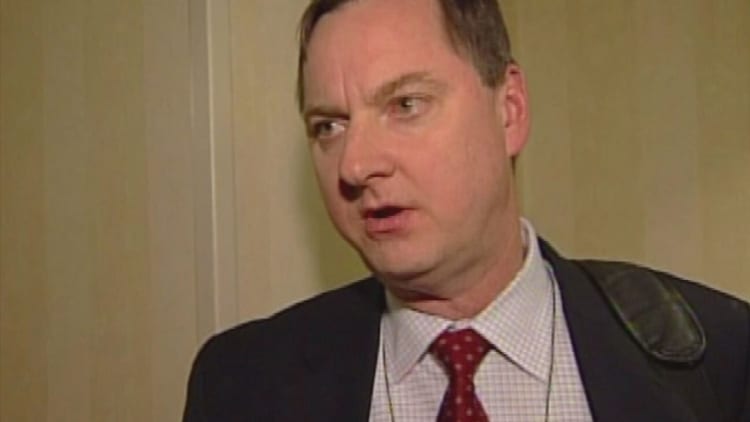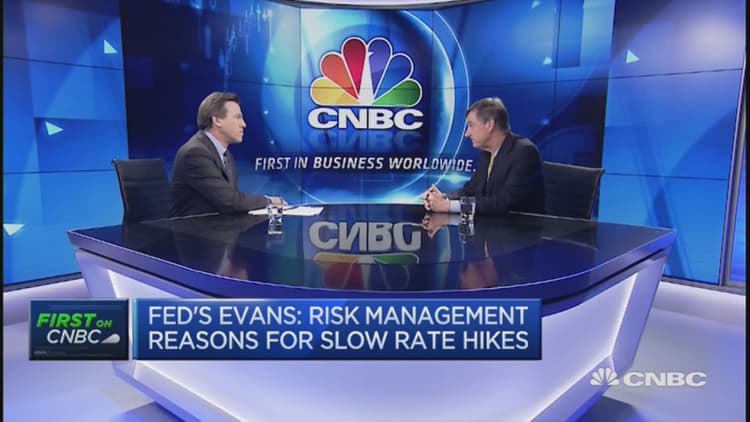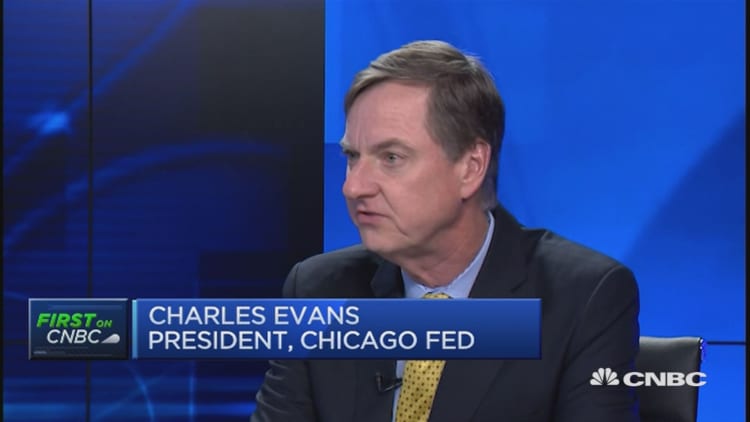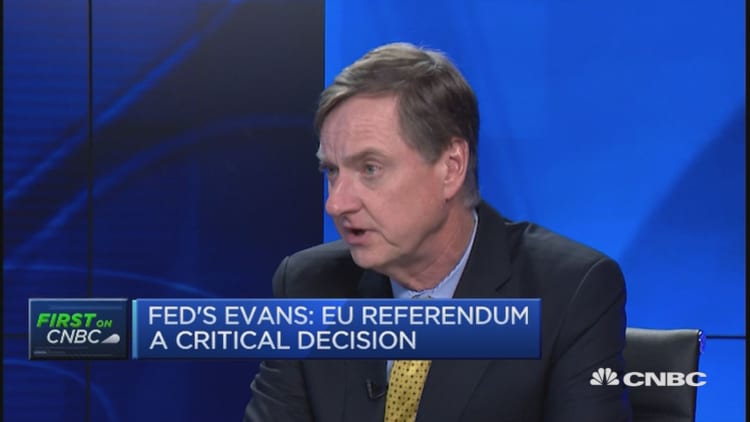



There could be two rate hikes in 2016 if data continue to be favorable but the timing of both won't prove to be crucial, Charles Evans, the Chicago Federal Reserve president, told CNBC.
"Two rate hikes in 2016, that's my own call for that, if the data continue to be in line with my outlook, that's a slow and gradual increase this year," said Evans, who is an alternate member of the FOMC (Federal Open Market Committee) and votes on decisions when a full-time committee member is unable to.
"Timing's not really that important, you mentioned possibly two summer hikes, that would be a little bit more than I'd say is … priced in to the dots certainly and the market expectations," Evans said in an interview Thursday which was aired on Friday.
"Timing's not really that critical for my viewpoint, as long as by the end of this year we're at just a little under 1 percent," Evans added.
"I think that's given us enough time to … assess how the U.S. economy has gone, the global influences and whether or not inflation is more likely to pick up in a confident fashion towards 2 percent. That would position us well for the next year," he said.
Market participants are eagerly anticipating the next rate hike from the central bank after it approved a quarter-point increase in its target funds rate back in December. This was the first move by the bank after seven years of accommodative monetary policy in U.S. history, following the financial crash of 2008.
Investors have had to rethink their expectations for the next move with a slew of Fed speakers recently talking up the prospect of a move this summer. Federal Reserve Chair Janet Yellen said last that Friday an interest rate hike is "probably" appropriate in the coming months if economic data improve.
"It's appropriate, and I've said this in the past, I think for the Fed to gradually and cautiously increase our overnight interest rate over time and probably in the coming months, such a move would be appropriate," she said in response to a question at Harvard's Radcliffe Institute for Advanced Study.
The CME Group FedWatch probability for a June rate hike rose after Yellen's speech on Friday and is now highlighting a 21 percent chance of a move at the Fed's June 15 meeting.
'Just need to do our job'
When asked about rate moves later this year, with U.S. elections due in November and the danger of the bank being drawn into a political debate, he said there had been previous times when the bank had needed to raise rates during an election cycle.
"Back in 2004 during the presidential election season, we started raising the funds rate which was 1 percent in June of 2004 and we started increasing rates by 25 basis points - what we didn't know at the time - each and every meeting for the next seventeen times. We went through the presidential election cycle doing that," he told CNBC.
"It was slow, it was gradual – although it was faster than what we are contemplating right now – and it was appropriate because interest rates had been low for very long and the economy was doing better."
He added that if the central bank moved later this year it would be a "natural policy response to the economy" and would only be what is expected of the bank.
"That's one reason why we need to have some measure of independence from short-run political concerns and we just need to do our job," he said.
'A very critical decision'
Meanwhile, Evans gave his views on the U.K.'s upcoming referendum of its EU membership, with Brits set to go to the polls on June 23. When asked whether a so-called "Brexit" vote would have any bearing on a rate move in June, he said it would have important ramifications for the country.
"I'm not an expert, and I think that it's a very critical decision," Evans said.
"I'm not sure it plays an important role in our policy making beyond us just monitoring the U.S. data and general global financial conditions and having confidence that things are still on a good track," he later added.
Investors in the U.K. received a sharp reality check this week after a new poll on the upcoming referendum highlighted that the vote might just be closer than many people were thinking. Two polls on Tuesday from U.K. newspaper The Guardian and public opinion researcher ICM suggested voters were split 52 percent - 48 percent in favor of the country leaving the European Union, a so-called "Brexit".
Outlook on the US economy
Speaking on Friday morning at a central banking event in London, Evans also gave his outlook on the U.S. economy, anticipating U.S. gross domestic product (GDP) to grow in the range of 2 to 2-1/2 percent over the remainder of this year.
"After the sluggish first-quarter annualized growth rate of 0.8 percent is accounted for, this would leave the increase in GDP for 2016 as a whole close to 2 percent — or about the same pace as in 2015," he said, according to a transcript of his speech.
He added that the U.S. consumer is the "linchpin" behind his relatively optimistic outlook, but iterated that there were several factors weighing on economic activity in the U.S.
"The slowdown in global economic growth — notably in emerging market economies — and uncertainty about international prospects have contributed to a rising dollar and declining commodity prices since mid-2014," he said.
"The trade-weighted dollar has appreciated about 20 percent since June 2014, while oil prices are down more than 50 percent over the same period. U.S. firms that sell their products in global markets and those exposed to commodity markets have felt the brunt of these relative price movements."





